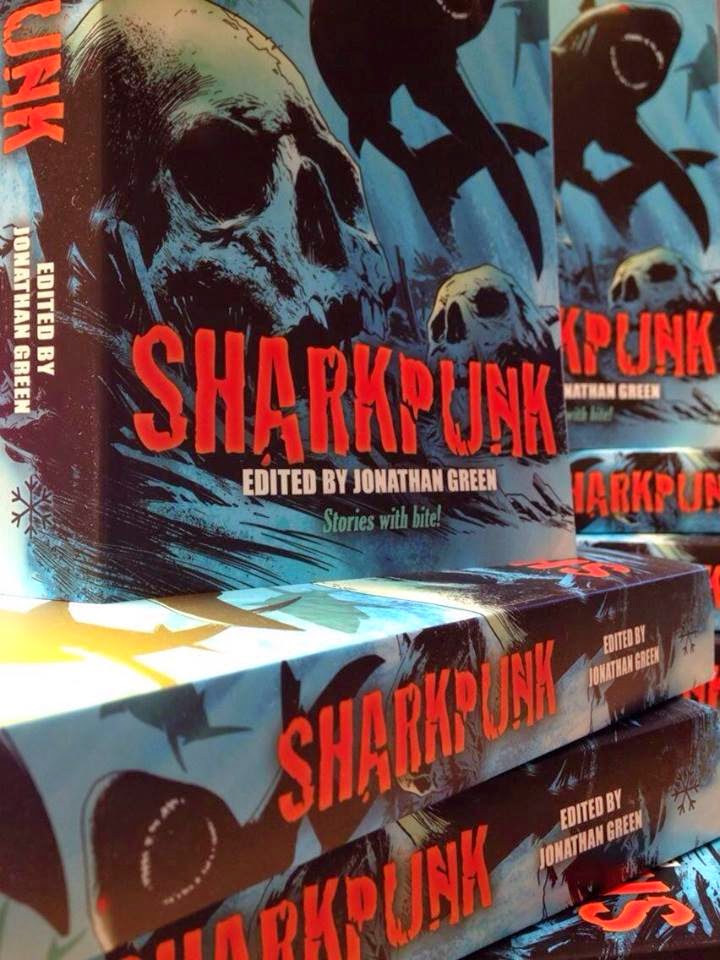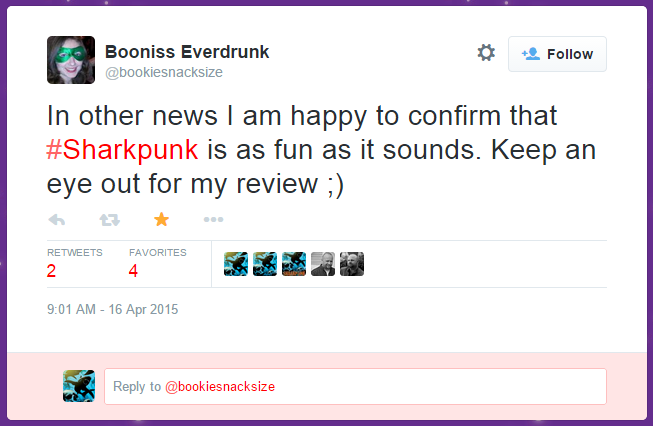I have known Clint Werner since we both wrote for Inferno! magazine back in the early days of the Black Library. So I was delighted when he agreed to write a brand new short story for SHARKPUNK...
Sharkpunk: What, do you think, is the reason for people's enduring fascination with sharks?
Clint Werner: I think the
appeal of sharks is two-fold. First there is, of course, the fact that your
bigger sharks are quite capable of eating a person. As a species we have a
vested interest in keeping tabs on the creatures that can kill us and most
especially the ones who sometimes add us to the menu. Most of your ‘man-eaters’
are heavily represented in folklore, heraldry and language, as though by
invoking these creatures we might also draw on their power and in some way
control their ferocity.
The second
point when it comes to sharks is that they are largely an enigma. We still
can’t say for certain how old or how large some of these animals can get. Their
social lives, limited as they might be, are an utter mystery. We aren’t even
sure what can drive some species to explode into the gruesome spectacle of a
feeding frenzy. These are creatures that defy many of the rules laid down by
science. They haven’t changed in any substantial manner in millions of years.
It reminds me of Nestor Pavia in the classic Creature from the Black Lagoon: ‘I tell you what I think, this
thing is stronger than what you call evolution.’
SP: What was
the inspiration behind your story ‘Feast of the Shark God’?
CW: I suppose the
germ of the idea began with an episode of In
Search Of…, a paranormal/speculative series that aired in the late 1970s
and early 1980s when I was growing up. Hosted by the late Leonard Nimoy, the
show always presented interesting topics, some more based in reality than
others.
 One of these episodes was devoted to Dakuwanga, a shark god worshipped
in the Fiji Islands. While presenting this
tradition, the show also explored anecdotal accounts that the islanders who dutifully
worshipped Dakuwanga were never menaced by sharks, even swimming about in
waters infested with known man-eaters. Of course, the catch there is that when
they did mention a local who was eaten by sharks, he was of course somebody
who’d fallen out of his faith.
One of these episodes was devoted to Dakuwanga, a shark god worshipped
in the Fiji Islands. While presenting this
tradition, the show also explored anecdotal accounts that the islanders who dutifully
worshipped Dakuwanga were never menaced by sharks, even swimming about in
waters infested with known man-eaters. Of course, the catch there is that when
they did mention a local who was eaten by sharks, he was of course somebody
who’d fallen out of his faith.
So, the idea
of doing a story revolving around Dakuwanga was there. Over time, it
metamorphosed into a fantasy tale removed from our own world and set in the
sword-and-sorcery landscape of Shintaro Oba. I conceived a story pitting the
demon-hunting samurai against a fearsome shark god and the community who
worships it.
SP: What
challenges, or surprises, did you encounter in writing your story?
CW: One of the
biggest challenges with my Shintaro Oba stories is trying to maintain a
Japanese mindset within them. Prior to the Meiji Restoration which saw the end
of the Tokugawa Shogunate, Japanese society was broken into a very strict caste
system and the majority of the Japanese people abided by the traditions and
obligations of that system. The concept of self, of the individual, was trivial
compared to being a part of something bigger, whether that be a farming
community or the retinue of a great samurai clan.
I think the
big surprise for me when writing the story was realising that, well, let's just
say the end turned out a bit different than I’d envisioned it in my outline!
SP: If you had
to pick a favourite shark, which would it be?
CW: I’m sure it
is as stereotypical as possible, but the Great White. Ever since I was a kid,
these immense monsters have been a source of awe. Going to the beach in California, it was
always at the back of your mind that these sharks were out there, somewhere
under the very water you were looking at. To drive the point home, there’d be
news stories when a Great White would hit a surfer or maybe swim up to a pier
and nab somebody’s catch.
SP: Do you
have a favourite fictional shark (in books, comics, films, or video games)?
CW: Again, I’ll
be stereotypical and say Jaws. When I
was growing up, the spectre of the first Jaws film and of course Peter
Benchley’s novel, still loomed large over the landscape. There were Jaws shirts
and toys and such and when the movie played on broadcast TV it was a major
event that they’d hype for weeks beforehand and take full-page ads in TV Guide.
 And then
there was the Jaws attraction at Universal City Studios, the highlight of their
tram tour. I’m not sure how old I was, certainly not more than six, when my
parents took me to Universal for the tour. Now, I wasn’t so terribly interested
in the Bates Motel or the I Love Lucy
bungalow, and there was only passing interest in seeing the Munsters mansion. I wanted to see Jaws, and
I kept letting everybody on the tram know it. Well, when the time came and the
tram approached the lagoon where the mechanical shark lurked, my father took
hold of me and held me over the side so I’d get a real good look as Jaws came
lunging up from the water. Being a snot-nosed punk I screamed and cried out
that, ‘Why doesn’t somebody shoot that thing?’
And then
there was the Jaws attraction at Universal City Studios, the highlight of their
tram tour. I’m not sure how old I was, certainly not more than six, when my
parents took me to Universal for the tour. Now, I wasn’t so terribly interested
in the Bates Motel or the I Love Lucy
bungalow, and there was only passing interest in seeing the Munsters mansion. I wanted to see Jaws, and
I kept letting everybody on the tram know it. Well, when the time came and the
tram approached the lagoon where the mechanical shark lurked, my father took
hold of me and held me over the side so I’d get a real good look as Jaws came
lunging up from the water. Being a snot-nosed punk I screamed and cried out
that, ‘Why doesn’t somebody shoot that thing?’
All these
years later, I still like Jaws.
SP: Apart from Sharkpunk, what's coming next from C L Werner?
CW:
Thanks, Clint!

C. L. Werner was a diseased servant of the Horned Rat long
before his first story in Inferno!
magazine. His Black Library credits include the Warhammer Hero books Wulfrik and The Red Duke, Mathias
Thulmann: Witch Hunter, the
Grey Seer Thanquol and Brunner the Bounty
Hunter trilogies. In the Time of Legends series he has penned the Black
Plague trilogy and Curse of the Phoenix
Crown, the final volume in the War of Vengeance series. Deathblade is his contribution to the
Warhammer ‘End Times’ event, featuring the dark elf tyrant Malus Darkblade. His first full-fledged foray into the gothic
sci-fi universe of Warhammer 40k occurred in 2012 with The Siege of Castellax. He is the author of Moving Targets, a novella set in Privateer Press’ Iron Kingdoms
featuring the iconic heroes Taryn and Rutger. In the sci-fi Old West of Wild
West Exodus, he contributed An Outlaw’s
Wrath in the Jesse James trilogy as well as some short fiction for an
upcoming anthology. Samurai warrior Shintaro Oba has previously appeared in
several anthologies published by Rogue Blades’ Entertainment. More recently,
his short fiction has been featured in anthologies like Kaiju Rising, Fantastic
Futures 13, Marching Time, A Grimoire of Eldritch Inquests and Sharkpunk.
An inveterate bibliophile, he squanders the proceeds from
his writing on hoary old volumes – or at least reasonably affordable reprints
of same – to further his library of fantasy fiction, horror stories and occult
tomes.







































%2B(647x948).jpg)

